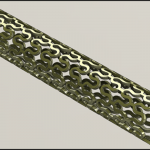The U.S. National Institute of Health has awarded us with R01 funding. Our laboratory has been working to refine the composition and microstructure of biodegradable Zn-based binary alloys and test their behavior in the vascular environment over the last four years in an effort to develop a metal with mechanical properties and biocompatibility required for endovascular stent applications. Having contributed enormously to the scientific understanding of Zn-based systems, we are now ready to develop more complex Zn-based alloys with 2-3 alloying elements that meet benchmark values for biodegradable stents, including: 1) have superior corrosion fatigue resistance that eliminates early stage (6 to 9 months) fracturing of biodegradable stents (common problem in Mg-based and Zn-based stents prototyped in the last several years); 2) maintain in vivo corrosion rates close to the 0.02 mm/year value; 3) exhibit >200 MPa yield strength, and >25-30% elongation to failure; and 4) demonstrate biocompatibility in terms of short- and long-term inflammatory responses, re-endothelialization, and suppressed intimal hyperplasia, similar or better than 316L stainless steel (industrial standard for stent materials).
Functional materials/surfaces, bioabsorbable materials, and natural minerals
Formulation, separation, processing, characterization, and application
-
Recent Posts
Archives
- August 2022
- June 2022
- May 2022
- December 2021
- July 2021
- March 2021
- January 2021
- December 2020
- November 2020
- July 2020
- March 2020
- February 2020
- December 2019
- November 2019
- September 2019
- August 2019
- July 2019
- June 2019
- May 2019
- April 2019
- March 2019
- February 2019
- January 2019
- December 2018
- November 2018
- August 2018
- July 2018
- June 2018
- April 2018
- March 2018
- February 2018
- January 2018
- December 2017
- November 2017
- October 2017
- September 2017
- August 2017
- July 2017
- June 2017
- May 2017
- April 2017
- March 2017
- February 2017
- January 2017
- December 2016
- November 2016
- October 2016
- September 2016
- August 2016
- July 2016
- June 2016
- May 2016
- April 2016
- March 2016
- February 2016
- January 2016
- December 2015
- November 2015
- October 2015
- September 2015
- August 2015
- July 2015
- June 2015
- May 2015
- April 2015
- March 2015
- February 2015
- December 2014
- November 2014
- October 2014
- September 2014
- April 2014
- January 2014
- October 2013
- July 2013
- June 2013
- May 2013
- April 2013
- March 2013
Categories

